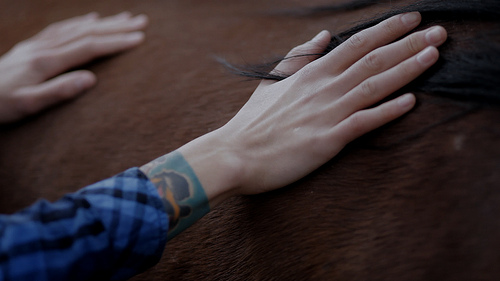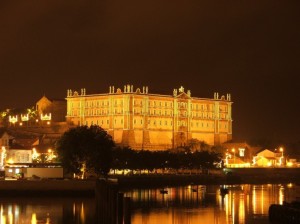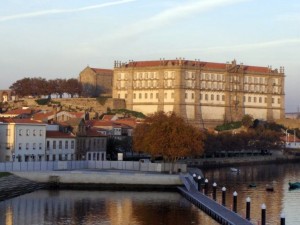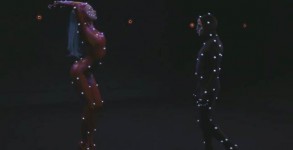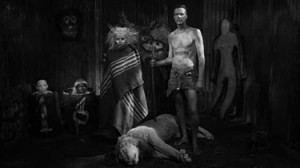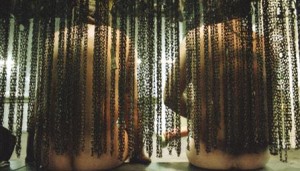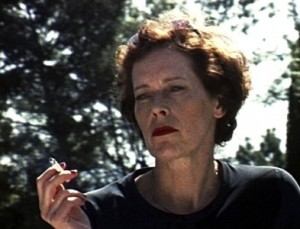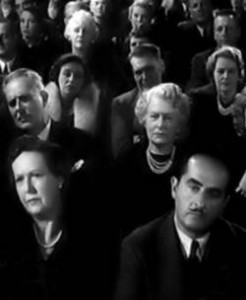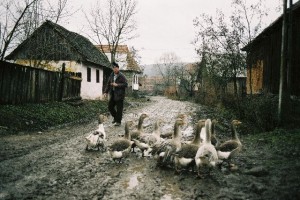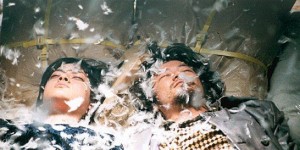It’s Saturday morning and the others haven’t stirred yet, still dreaming of the air guitar contest that began at 2:30 this morning. Some may still be there, reliving past glories, but for now I feel tired of the perfect festival, the four star hotel the Greek footballers stayed in while taking the treasured cup, the programs of short cinemas which provide the backdrop for stories in the cafe, where identities are wagered and lost and won again. It’s July in Portugal, a day after the treasured national team dropped the Euro Cup to the Greeks (The Greeks! Nothing but defenders! The Portugese, like the Brazilians, understand that football is a dance, a demonstration of joy and the risks that make joy possible, not some dull guarding against catastrophe) and the country is hung over. It’s been a long month, an unexpected joy ride with room enough for everyone in black and yellow to climb onboard, and now there is a festival to attend, the twelfth edition of Vila Do Conde. It’s run by “the boys,” five local maestros who grew up together, and the trick of it is, even these many fests later, none of them look professional, not even Miguel who does most of the introductions. He slouches up to the mike and talks the talk then steps back into the shadows. I love their faces, between the movies I look at them every chance I get, their open watch not yet surrendered to duty and obligation, not yet posed for their public moment, after all those movies, and the phone calls and all day meetings which make the showing of these small cinemas possible, their faces still shine, and even more than the films they deliver that gives me hope.
Ugo is a VJ from Midora, a postcard of an island dropped in the Atlantic, remnant of former empires. “Are there many VJs on Midora?” I ask him, and he holds up two fingers. He looks like Ibiza on two legs, with his casually handsome face, he orders a dish of bull meat and tapes everything he can get his hands on, internet effluvia, TV programs, video store drop outs, then selects moments for looping. He has about 5,000 now. “It’s like Chiclets,” he says, shaking his hand in the air, “the taste is good but it only lasts a minute, and then you need another.” He lenses his own life but never shows it, Chiclet TV is about raiding the vaults of mainstream monoculture and emptying it out, letting it loop into the vanishing point of all night danceramas, where forgetting is a new generation’s prelude to romance.
Festivals of shorts dot the cine landscape, squatted by young ideals a decade or two past, they have turned into professional enclaves, still marginal of course, how many watch shorts after all, unless they’re packaged as commercials for pop stars or tires, but there is something of a landscape about them. You look out the window and there they are, precarious and enduring, the Stuttgart Filmwinter, Oberhausen and how many others, rolling out exotic treats for an audience which is rarely home grown and watered. I’ve only seen it in Ann Arbor, where their nearly fifty year old fest held in an art nouveau palace on the main drag attracts barbers and insurance salesmen, hardware store fetishists and students. But mostly fests find it hard to sustain audiences, there’s an annual flash that lights up the city for a few days, and then it’s drowned in the multi-national din once again, so the organizers grow older as the audience stays young, the row on rows filled with those who haven’t made up their minds, retreated behind the safety codes of family.
Vila’s no different in this regard, the old men who stand on the bridges all day casting their rods into an unforgiving river are not interested in short fare, no matter how many international guests pass them on their lonely vigil. Wonderfully and impossibly, like the films which play in the easy, raked recline of the Auditorio Municipal, their efforts are made without outcomes in mind, there is no utility in their activities, at the end of the day they return their catch to the river (it’s too polluted to make eating fish safe). They refuse progress, unafraid of the inefficient, these silent wizened veterans. They’re not trying to get somewhere, they are somewhere. Standing hour after hour as the sun lengthens their shadows and shortens them, they might be standing two meters apart, one after another on the bridge, or by the candy striped lighthouse on the stone pier, but it’s rare you hear any of them breathe a word of it. They stand in the perfect, merciless sun casting their lot into the sea, waiting for us to join them.
Jiska Rickels’s Untertage (24 minutes 2003 Holland) shows a day in the life of German coal miners, a tough underground world of men blasting through rock (can these small creatures with an eye of light on their helmets really be part of our world?). Wordlessly they make their descent and follow the vein of precious ore that will provide heat for the other place, the one they’ve had to leave behind, the soft first world of escape and romance and addiction. They rely on one another, this community stifled by noise and cramped conditions tending to vast machines which burrow and sift and transport, and when it’s done they share a naked cigarette, their darkened faces admitting the cancer stick, then retire to the showers where, improbably, they scrub each other’s backs, a solidarity of tenderness in this man-made inferno.
Sylvia Kristel-Paris by Manon De Boer (40 minutes 2003 Belgium) is a double-taked documentary featuring the famous actress recounting her early life in the movies, which she narrates in separate voice-overs recorded a year apart. Over amateur shots of Paris she speaks the story of her life, though each version is markedly different, and while it’s a fascinating rap (meetings with producers, her decision to star in Emmanuelle, her marriages and addictions) when she recounts the same events for a second time the omissions are choice, she never lies, there’s no reason to, but she withholds, and bigs up other moments, so what we are witness to is the work of memory. Two sequences of Kristel frame her confessions, both showing her smoking in medium shot on a terrace, where she is clearly directed (turn now, smoke now) demonstrating again what her voice-over tellingly betrays, that there is hardly a private moment left in her, that she has a face the camera loves, sure, but it has turned her inside out, she has told this story too many times, and the stories of her once and future loves is also a way of staving off this final emptiness, the cost of exposure which she bears for each of us as we shoulder our own burdens of presentation.
Play by Matthias Mueller and Christoph Girardet (7 minutes 2003 Germany) is the head of the class, a bravura found footage display of audiences, gathered in an assembly which bears Mueller’s unmistakable narrative inclinations. Like Cobain, the grunge guitarist who “chewed bubblegum in his sleep” (provoking melodies in all the feedback) Mueller unfailingly delivers storytelling even in this most ubiquitous of genres. (OK OK, I can admit it now, I’m getting tired of these stolen pictures, they’re everywhere now, what I long for is some moment of Otherness, some engagement with the real, except when it plays in the hands of these two, Christoph and Matthias, who are the reason cinema had to be invented, so it could stolen and reviewed in their perfect hands). Play is an easy ride through (mostly) Hollywood audiences, ripped from 50s movies and replayed in common moments (several audiences stand up together, or wait together in a hush, or applaud enthusiastically). Belying its candy coated surface is a sharp take on the formation of subjectivity as individuals make their way from the crowd, close-ups of Grant and Taylor turn nervously, something is missing, gone awry, and it is out of this absence the subject is borne. Curiously, even perversely, this elegant short stuffed with people is about loneliness. Solitaries step out of the crowd not in order to find what is missing, but to embrace it!
Victor Asliuk, the Russian maestro of the short form doc is back with a home movie about a young family set in rural Russia. Like the subject this movie is slow paced, with a heavenly black and white crispness underscoring daily life, plowing the fields, and a final athletic turn showing a refusal of progress and modernity. OK, Nicklas says, he’s seen a hundred just like it, typical former East bloc langour and beauty, nostaghia for a once and vanishing life. But to these eyes it looks intimate, a big movie made of little daily nothings, baby’s breakfast, game playing with mom and dad, but that’s a 35mm camera in there soaking up the light so I look on with respect. (The subject matter may function like Lars Von Trier/Jorgen Leth’s Obstructions, where the director limits himself via pre-arranged rules to how his movie can be made. He feels he’s so flash he can overcome these obstacles, or in the act of overcoming find the movie he needs to make and perhaps Asluk is the same, but in a more earnest, from-the-heart way. Not for him the calculations of international co-productions.)
Most festivals gather their wares in theme programs, the sequencing of shorts remains a crude, kindergarten-level pursuit with shows that are invariably too long, and programmers trying to show off what they imagine is intelligence by grouping movies that look the same, or are about similar themes, together. Vila is different. Unlike almost any other festival, Vila strives to keep each work separate and unique. Each piece may be experienced by itself, as itself, so programs typically mix documentary, animation and fiction. There were two movies “about” UFOs and in any other festival these would run back to back, here at Vila, mercifully, they were kept apart, so each could preserve its integrity.
Paolo is the resident Puck, convinced via South Park that Canadians are round yellow creatures which split in half every time we open our mouths. “On the other hand the Portugese…” he begins, he has opinions about the Portugese film artistes which he’s never slow to venture, “they walk like this,” he demonstrates, swelling his chest out, “and when they watch a film, even a comedy, they sit like this,” he shows us, one hand pensively propping up his chin, a seriously intent expression on his devil-may-care face. Paolo is never serious for long, but can’t help saying serious things. He laughs because he cares. “The problem with the Portugese film is that they think cinema is made with computers. You have a problem with light? Add it in aftereffects. Bad framing? Crop the picture later. They spend their whole lives on the computer, they don’t understand cinema is made here, “ he says gesturing into the crowded Jameson bar, “It’s a question of living first, the technique is only dressing.”
The most troubling moment of the fest for me was Dead End Run by Ishii Sogo (60 minutes 2003 Japan), an avant-garde trash movie in three parts. If this were a piece of music imagine that all foreplay, preludes and counter melodies have been banished. In their place the final drenching chords of triumph, and now in Sogo’s hands, these notes have been stretched out to the full length of the piece. It’s a gangster flick, who are they, why are they being hunted down, who cares? A man runs, hides, someone enters and he pipes them, but it’s the wrong person, a woman, who bleeds to death, then resurrects in order to speak and sing. They dance together, part Fred-and-Ginger, part MTV and then his chasers arrive and shoot him. It’s show-stopping visually with a keenly kinetic visual sense, stop and start motion, angles never seen before and delivered so smooth you could land a meringue pie on it and eat it off the floor. It’s all lathered over with four channel crispness that had the audience turning its head when it wasn’t swaying to the bigged up guitar crunch. The two other parts belong to the department of redundancy department, they’re pretty much the same, everyone dies in the end (“The good die without luck, the bad unhappily, that’s what tragedy is” (Stoppard), blood is everywhere, everybody looks stylish (designer ware wrapped in shades and big guns) and so what? There is so much feeling but it’s all in the design and its execution. It’s like those avant nerds who go on about “the grain,” “the emulsion,” like boys who gather around car engines. Machines in place of emotions. Sugo is one of them, but not one of them. He’s got avant chops galore, but his subject is strictly B-movie fare with its wafer thin plotlines and a-go-go action sequences. His hyperbolic treatments are a comment on the genre, nourished with the loving attentions of a fan. He manages to empty out the form of the avant and his cherished B (non) narratives at the same time, until this movie exists at some terminal juncture of representation. I can do everything, but there’s nothing to do, and I delight in doing it.
Sayanara (hello, goodbye) baby.
